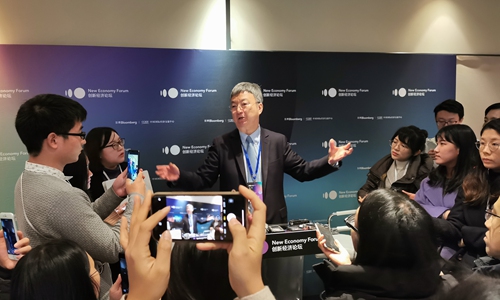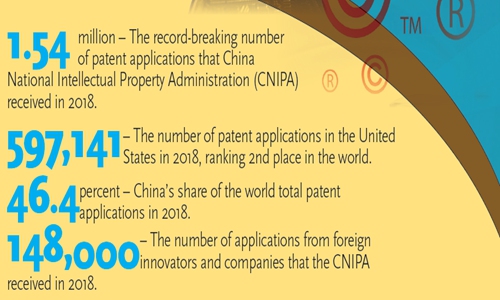
Zhu Min talks to reporters at New Economy Forum in Beijing on Friday. Photo: Zhang Ao/GT
China is not vying to become the first among major global economies to launch its fiat digital currency, Zhu Min, former deputy governor of China's central bank, said on Friday.
"It doesn't matter if [China] will be the first, and no one is vying to become the world's No.1," Zhu, former deputy governor of the People's Bank of China (PBC), said in response to a question raised by the Global Times on the sidelines of the New Economy Forum co-hosted by Bloomberg and the China Center for International Economic Exchanges in Beijing.
The most important thing for China's digital currency push is to ensure the policy and technology framework are mature, he noted.
China, Canada, Britain and Singapore are at the forefront of digital currency research, said Zhu, also an ex-IMF official.
Digital currency is a future trend, and central banks are under pressure from the market as cryptocurrencies are eroding sovereign currencies.
Small countries in particular are worried that their sovereign currencies may take a hit if they don't issue digital ones, Zhu stated.
The central bank of Uruguay was the world's first to become digital-currency-ready, following its announcement in November 2017 that it would begin a test to issue digital Uruguayan pesos.
Zhu reckons that Facebook's Libra poses a potential challenge for sovereign currencies issued by central banks.
According to Zhu, the PBC-backed digital currency plan known as Digital Currency Electronic Payment is a feasible and controllable framework which was envisioned to allow for effective monetary policy transmission.
The PBC began to research digital currency in 2014. It has a digital currency research institute and a special team for this purpose, PBC Governor Yi Gang revealed in September, noting that presently, progress is being made.
The former deputy managing director of the IMF also touched on the thorny trade issue involving the world's two largest economies during the interview.
"There have been detailed discussions about trade figures during the China-US trade talks, but the US has always taken more things into consideration, complicating the negotiations," he said.
"The trade talks are contingent upon the US eventually becoming aware of the problem and thus striving to sit down with China to address some final issues," he said.

Photo: GT





